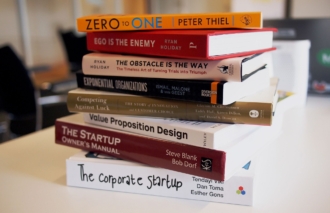Each one of our precious brains processes 34gb of information a day.
That’s 100,000 words a day.
And that’s only in our leisure time.
More Information. Quicker. Faster.
Everything is whizzing by at such a speed that to simply stop and pay attention to something is hard. Even to the act of reading.
Tim Ferris has even developed a comprehensive technique to make us read ‘300 x faster’.
But do we really care enough about reading?
Nearly a quarter of American adults say they haven’t read a book of any kind in the past year. And on average, most adults read 17 books per year.
But how many of us actually appreciate the true value that reading brings?
For many successful entrepreneurs, reading has mostly been seen as a way to increase personal progress, productivity and business growth.
When I first started Jotform back in 2006, I was approaching reading like I approached any other task. I’d make lists of books that were recommended to me or topped the bestsellers in the business section, and I’d try to read as much as I can.
I’d either try to be super fast, using a technique similar to that of Ferris, or I’d try to hit aggressive goals like reading 50 books a year, like Bill Gates.
Yet over time, I started questioning a few things about my reading behavior:
Why would I give one of life’s greatest enjoyments a KPI, a deadline, a target? Our world is already full of rules and benchmarks — do I need to regulate this too?
Here’s what happens when you read for the sake of reading:
You barely retain any of the knowledge.
You sacrifice reflection and introspection.
You absorb very little.
It’s true that reading widely is something many successful people have in common. Successful people tend to be curious about the world they live in.
But it’s not about how much they read. It’s about how they read.
“In the case of good books, the point is not to see how many of them you can get through, but rather how many can get through to you.” — Mortimer J. Adler
Valuable reading is deep, not shallow.
That’s one of the reasons why reading 100 books a year won’t make you successful. You can’t ‘hack’ reading.
Reading because you want to, not because you feel you should.
When you can’t put a book down. When your brain fizzes with satisfaction as you turn each page. While you eat, in the bath, on a park bench, standing up on the subway. Devouring a plotline, a theory, a method.
Thinking “Yes — this is for me.” Getting so lost that you don’t hear the doorbell rang.
It’s this reading that lengthens our attention spans, expands our vocabulary, and help us squirrel away golden nuggets of information. We can’t help it — when reading is not for the sake of reading, the content stays with us.
But when we read out of duty, it may melt away — the same way we forget what we’ve learned after a boring exam.
(If we’re reading to relax, this doesn’t matter).
But, if we’re reading 100 books a year in the pursuit of self-improvement, it does.
Personal development books are only as helpful as the action we take after reading them. All the methodologies and frameworks in the world won’t impact us if we can’t process them properly.
Elon Musk and co., attribute their success to reading because they read purposely, and apply that learning in the wider context of their careers. They didn’t plough through huge volumes of material as a box to be ticked.
Reading counts when it’s retained and put into practice.
The compound interest of reading
Warren Buffet, the successful entrepreneur, attributes most of his success to reading. He estimates that he spends up to 80% of his day reading:
“I read and think… That’s how knowledge works. It builds up, like compound interest. All of you can do it, but I guarantee not many of you will do it.”
Maybe the reason we aren’t investing so much time into reading is that we’re confused about the ROI of books — after all, the return on our reading investment isn’t immediately obvious.
We can easily underestimate for how long books stay with us, how much they change us.
Books aren’t created equal, either. There are books that resonate with some and scoop up accolades but will bore others to tears.
And there are remarkable, beautifully-written, insightful books. These books are meant to be pored over, savored, corners left dog-eared, passed on to friends and passed back again.
The value we extract from books isn’t a one-time event.
I find myself returning again and again to the same books. They feel like the coziest pairs of worn-in jeans. And every time I re-read them, I notice something new.
“I don’t want to read everything. I just want to read the 100 great books over and over again.” — Naval Ravikant
When we re-visit a book, we notice it makes much more sense than it did before. We realize the book didn’t change but we did.
For this reason alone, the compound interest or the ROI of books cannot be understated. Matt Haig, author of the bestselling Reasons to Stay Alive, is almost evangelical about the power of reading for him, saying books ‘saved him’.
Because, along those words, there is someone who understands. Who has been there. Faced what you’re about to face. Made mistakes before you have. Has got the knowledge you need right now.
Protect your reading time
Once we appreciate the long-term value that books offer us, we are more likely to intentionally carve out dedicated time.
Think of it like a scheduled ‘date night.’ Using Elizabeth Gilbert’s words, we should read ‘when we’re ‘open and relaxed enough to actually receive something.’
When you make space to truly read, you are fostering an environment that allows your mind to not only connect with the ideas on the page but also one that gives your brain time to make new, insightful connections.
In The Power of Doing Nothing, I talked about ‘Think Weeks’ and embracing the digital sabbath. Like Neil Pasricha, I also like the concept of having an ‘Untouchable Day’ every week, shielded from the barrage of modern life.
It’s enabled him to get seriously productive, but it could also be used for reading and reflection time too.
‘On the actual Untouchable Day itself, I picture myself sitting in a bulletproof car surrounded by two-inches of thick impenetrable plastic on all sides. Nothing gets in. Nothing gets out. Meetings bounce off the windshield. Texts, alerts, and phone calls, too. My cell phone is in Airplane Mode all day. My laptop has Wifi completely disabled. Not a single thing can bother me… and not a single thing does.’
Reading is magic.
It’s teleportation and telepathy.
It lets us roam across space and time, oceans and continents.
It lets us pick the brains of the most astonishing people on earth, access the wisdom of the past and see into the future.
Reading has many unintended consequences: we hold multiple interesting perspectives in our mind, practice listening to the opinions of others’, and accept we’re not always right.
But no one should measure their worth by how much they do, or don’t, read. Reading isn’t a to-do list item.
Yes, reading educates, it increases empathy, it emboldens us. But it can also just be fun.
So perhaps we should all stop taking it so seriously, and start enjoying it for what it is: a wonderful pass-time — not a shortcut to a bigger bank balance.
Don’t read to make yourself successful. Read to make yourself happy.
Read slowly. Read thoughtfully.













Send Comment:
1 Comments:
More than a year ago
I rarely comment on any blog, but your post this time really strucks me and I can't thank you enough for writing such a wonderful article. A bookworm myself, I love to read and write reviews or summaries of the books that I read. I even subscribe to Blinkist which provides summaries of books. But I think in some way I have to admit that sometimes I read with the intention to quickly finishing the book rather than enjoying the narrative that it presents. Sure some books couldn't entice us enough to get through it till the end, but then your suggestion to reread books that we truly enjoy is honestly a thing that I did overlook before this. Thanks to you, I today grasped two valuable lessons, first is to reread books that we found to be meaningful and secondly is to pursue reading as an enjoyable activity rather than aiming to achieve more number of pages that I have gone through.